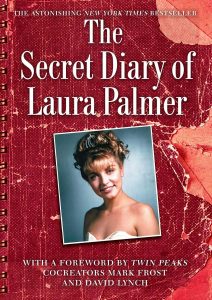The Hidden Gem of Twin Peaks
Kyle Labe//Blog Writer
The question of “Who killed Laura Palmer?” may have been answered decades ago, but the image of the high school homecoming queen, dead and wrapped in plastic, still haunts pop culture to this day. Twin Peaks, the iconic serial drama from the 90s, has been deemed a revolutionary cult classic, aestheticizing primetime and altering the way we watch television forever. When the show’s creators, David Lynch and Mark Frost, announced that it’d return over 25 years later, it seemed the franchise was back. With it came the reprint of The Secret Diary of Laura Palmer, Jennifer Lynch’s 1990 spinoff that hit The New York Times bestseller list between the first and second seasons.

The Secret Diary doesn’t read like a spinoff. It was written by David Lynch’s daughter to chronicle the maturation of the show’s “beautiful dead girl” trope. Before it, Laura Palmer’s character could only be pieced together through flashbacks and clues. Viewers quickly found out that the poster child dream-girl harbored her share of secrets, from a cocaine addiction to illegal sex work to affairs and, eventually, a dark history of being victim to rape for the majority of her childhood. The reveal mid-second-season furthered the latter, but I won’t relay any spoilers.
The character portrait of Laura Palmer is one both raw and real, capturing the essence of a girl living with trauma, but trying to do good and be happy. Jennifer Lynch accomplishes her likeness. When I mentioned that The Secret Diary doesn’t read like a spinoff, I wasn’t dramatizing it. It’s almost as structured and well-written as a typical YA novel, telling a bildungsroman tale without all the gloss and the stereotypes of young, star-crossed lovers and manic pixie dream girls and dystopian wastelands. When it comes down to it, The Secret Diary is about one girl attempting to find purpose despite incessant abuse, trying to piece together what’s left of her life in a struggle for identity, independence, and love.
The entries begin on Laura’s twelfth birthday. It starts off pure and innocent, with meditations on having her first period, her first kiss, meeting Bobby, later her boyfriend, but now just another schoolboy that tugs at her ponytails. She writes poetry, takes care of her pony at the stable, tries smoking a cigarette during a campout with her friends in the backyard.
However, the book turns dark fast. Once the truth about BOB, her occult abuser, leaks out onto the page, Laura’s life swiftly spirals into something uncontrollable. At times, it proves hard to read. It’s sad, very sad. Lynch’s prose imbues a strange sensation of relatability and compassion, pity and empathy which is rare to find in similar novels. So much happens to Laura, and—try as she might—she can’t find a grip to which she can hold. Her addiction and her trauma claim her life. She thinks herself utterly hopeless and completely alone in life, not being able to relate to anybody, wholly separate from the world she inhabits. This depression causes her to act out in ways she doesn’t want to, as means to cope with the abuse. She tries and tries to be good despite the bad that’s happened to her and the bad things she does. It’s an unfailingly realistic portrait of a human being torn between bad and good, who makes mistakes and has flaws, but attempts to surmount them and reclaim her life. Overall, it’s a book about the loss of innocence, that foundational age of transition.
 What’s especially intriguing are Laura’s interpersonal relationships, notably with her boyfriend Bobby and her best friend Donna. Bobby and Laura start off as your typical high school power couple: the quarterback and the homecoming queen. But their rocky relationship is plagued by drugs, affairs, and corruption, turning into an intricate connection that surpasses what’s seen in YA. They become objects of convenience to one another, remaining together only for the company of another person and the cognizance that they may only have each other. It’s devoid of love, but rather full of yearning, a longing for love and affection that they can’t seem to find anywhere. Laura and Donna begin as childhood best friends, inseparable for most of their adolescence, but as the two grow up they slowly drift apart. Laura’s life goes one way while Donna’s goes the other. Laura starts to resent Donna’s “perfect” life, how uncorrupted and pure she remains despite the horrible things that have afflicted Laura. As Laura puts it, “We’re like anyone else, I guess. We promise that something is forever, when it is really only as long as it takes for us to tire of it” (Lynch)
What’s especially intriguing are Laura’s interpersonal relationships, notably with her boyfriend Bobby and her best friend Donna. Bobby and Laura start off as your typical high school power couple: the quarterback and the homecoming queen. But their rocky relationship is plagued by drugs, affairs, and corruption, turning into an intricate connection that surpasses what’s seen in YA. They become objects of convenience to one another, remaining together only for the company of another person and the cognizance that they may only have each other. It’s devoid of love, but rather full of yearning, a longing for love and affection that they can’t seem to find anywhere. Laura and Donna begin as childhood best friends, inseparable for most of their adolescence, but as the two grow up they slowly drift apart. Laura’s life goes one way while Donna’s goes the other. Laura starts to resent Donna’s “perfect” life, how uncorrupted and pure she remains despite the horrible things that have afflicted Laura. As Laura puts it, “We’re like anyone else, I guess. We promise that something is forever, when it is really only as long as it takes for us to tire of it” (Lynch)
Sure, The Secret Diary is chock full of references to the show. Any television spinoff is bound to have that. But I hesitate to label it as a spinoff, just because of the stigma behind the term. Calling it so would throw it in a pile of rushed, poorly-crafted commercial fiction that collects dust in discount bins at your local supermarket. The Secret Diary is a standalone piece of literature. Jennifer Lynch poured her heart and soul into this project, and it reads as such. I’d recommend the book to anyone, Twin Peaks fan or not. Anyone can read it and comprehend the story—the tale of a lost teenage girl searching for meaning in a world that doesn’t want her to is both universal and necessary to tackle. You could read it just to fill in the gaps the show left, or you can read it and actually come out of it with something. Personally, that’s what I think it’s meant to do.
